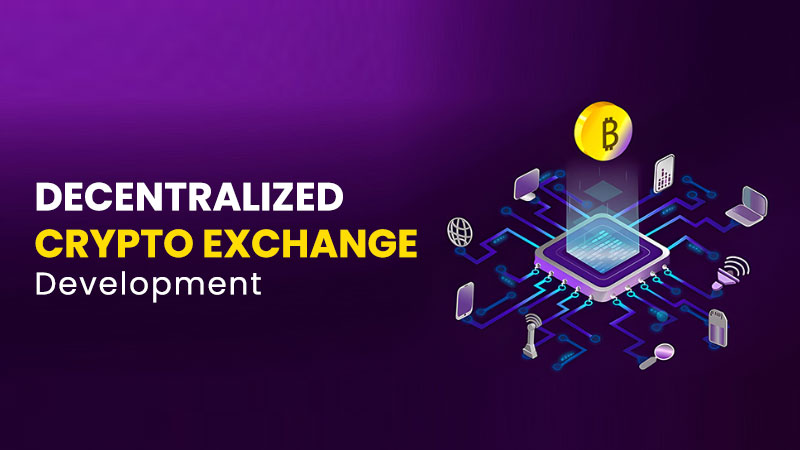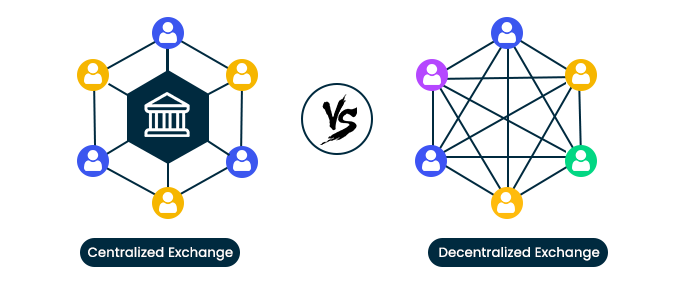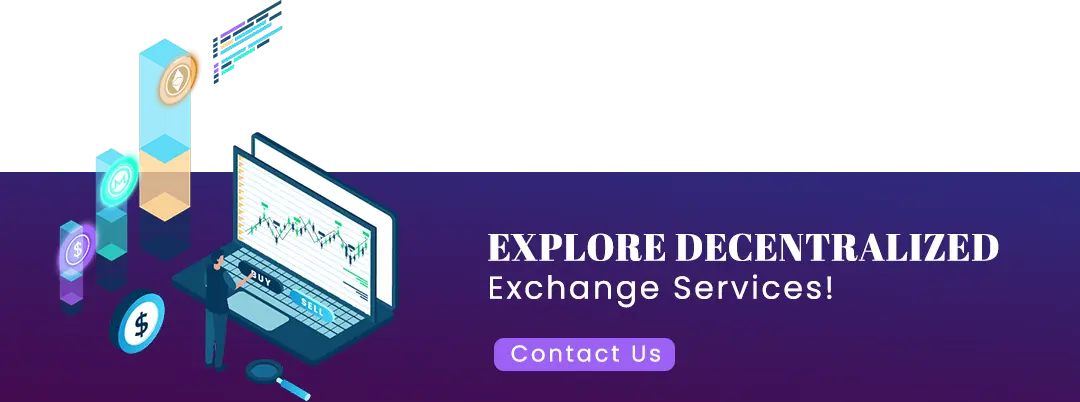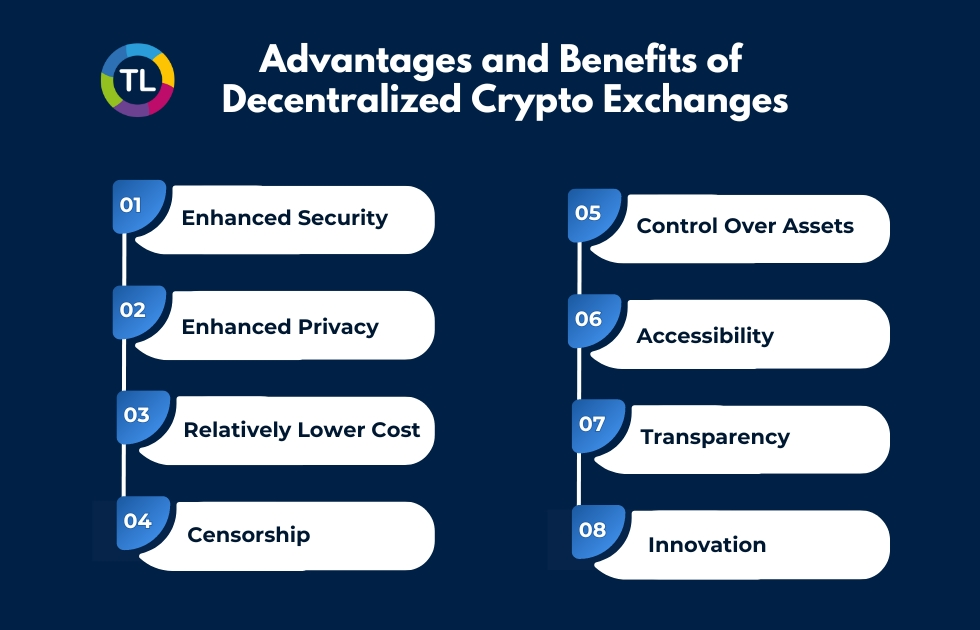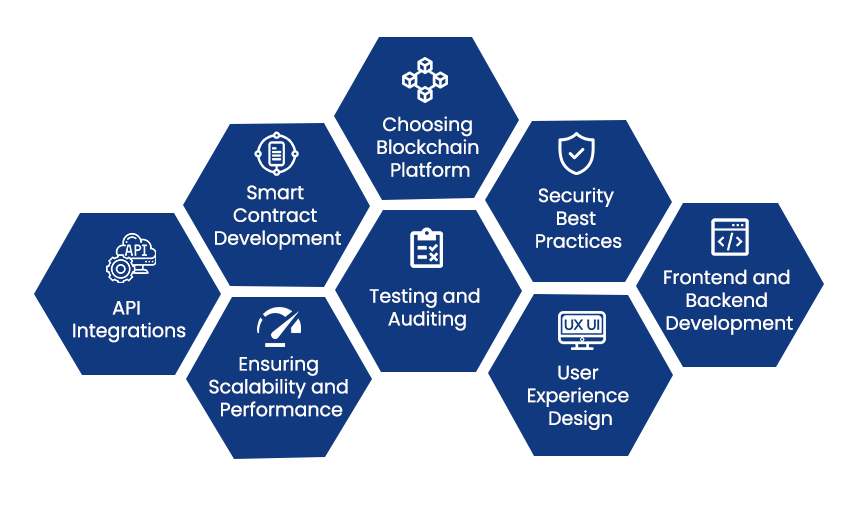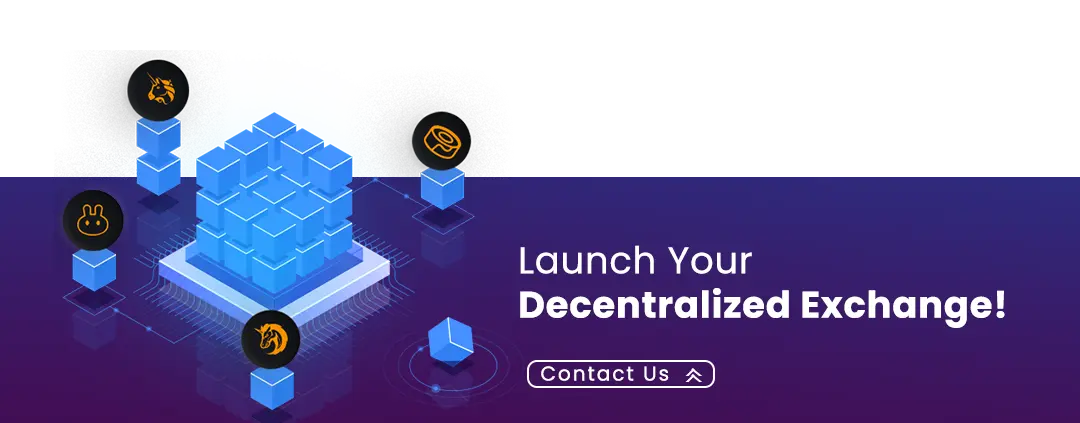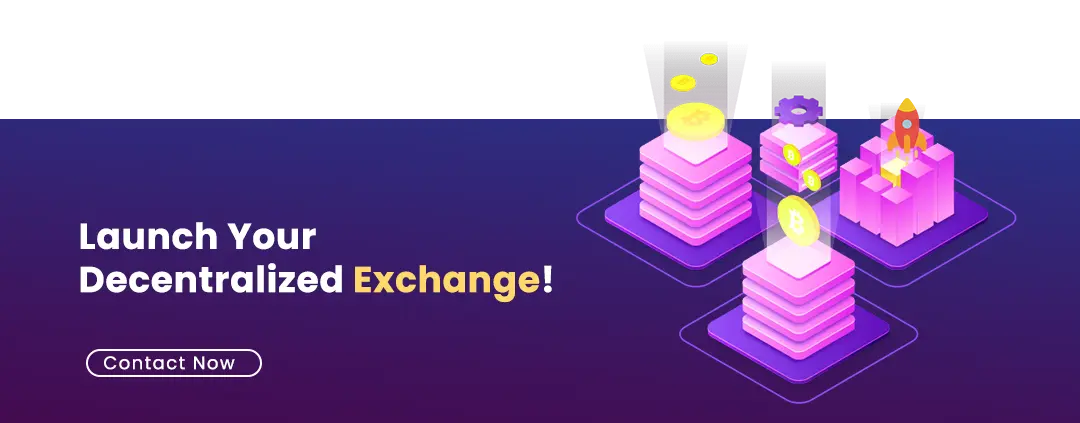Decentralized crypto platforms such as Ethereum, Uniswap, and 1inch are quite popular and among the most trusted crypto platforms for performing crypto trades. But what makes these decentralized crypto exchanges so popular?
If you also have this intriguing question in mind, this blog is for you.
This blog is your go-to guide for a complete understanding of decentralized cryptocurrency exchanges. From its various advantages to the comprehensive decentralized crypto exchange development, we’ll discuss it all.
So, without further ado, let’s get started!
Table of Contents
- 1 Definition of a Decentralized Cryptocurrency Exchange
- 2 Comparison Between Centralized and Decentralized Exchanges
- 3 Advantages and Benefits of Decentralized Crypto Exchanges
- 4 Key Components and Features of a Decentralized Crypto Exchange
- 5 Planning and Strategy for Decentralized Crypto Exchange Development
- 6 Technical Development of a Decentralized Cryptocurrency Exchange
- 7 Decentralized Crypto Exchange Solutions and Security Measures
- 8 Launch and Deployment of a Decentralized Cryptocurrency Exchange
- 9 Conclusion
Definition of a Decentralized Cryptocurrency Exchange
Decentralized cryptocurrency exchange also known as DEX is a platform where people can trade cryptocurrencies directly with each other without the influence of any central authority. A decentralized crypto exchange is quite the opposite of a traditional centralized crypto exchange where the trade is operated under the authority of a central authority.
In a decentralized crypto exchange, blockchain technology is used to process and record transactions. This means that transactions are made directly between users formerly known as peer-to-peer without the need for an intermediary to manage the transaction operations.
On a decentralized crypto exchange, users are always in control of their money. It is solely due to smart contracts, which are auto-execute contracts with specifications written directly in code.
All the transaction operations are managed through these smart contracts, ensuring that both parties complete their part of the transaction without the need for a central party.
Comparison Between Centralized and Decentralized Exchanges
Here’s a quick comparison between centralized and decentralized crypto exchanges based on some important aspects –
Security
One of the major differences between centralized and decentralized exchanges is the way through which these exchanges handle the security of the crypto trades. Centralized exchanges store user funds in their own wallets. Despite the fact that centralized exchanges often use strong security measures to protect crypto funds, they are still attractive targets for hackers.
In case of a hacking instance of the centralized fund, the user’s funds can be stolen. For a fact, there have been ample high-profile cases where millions of dollars in cryptocurrency were lost.
Read More: A Comprehensive Guide to Hybrid Crypto Exchange Development
On the other hand, Decentralized exchanges provide users with complete control of their own funds. Instead of storing assets on the exchange, users trade directly from their personal wallets. Therefore, even in the case of the exchange being hacked, the user’s funds remain safe because they are not stored on a central server. Consequently, the risk of large-scale thefts is reduced significantly.
User Control and Privacy
Verification processes such as Know Your Customer (KYC) are mandatory on centralized exchanges in order to verify the user’s identity. On one hand, where this verification process is essentially done to comply with the law and prevent illegal activities, it also compromises the privacy of the user.
In contrast, DEX platforms do not ask their users to provide any personal information. Consequently, giving users complete anonymity, ensuring their privacy.
This is an important benefit for those who value their privacy and are reluctant to give out personal information online.
Cost and Fees
With every transaction on centralized exchanges, a certain fee gets charged, be it transaction fees, withdrawals, or deposit fees. The amounts can vary greatly from exchange to exchange, but they often add up, especially for frequent traders.
When trading through decentralized exchanges, the fee charge associated with the crypto trade is relatively low. This is due to the fact that there are no intermediaries in the process.
Generally, the available costs are limited to the costs of smart contract execution and network transactions. As a result, trading on DEX can be extremely cost-effective.
Advantages and Benefits of Decentralized Crypto Exchanges
Let’s list out some of the major decentralized crypto exchange features —
Enhanced Security
As discussed above, DEXs offer robust security because users have complete control over their funds. Hence, there is not a single point of vulnerability for hackers to target. This makes DEXs a safer way to trade cryptocurrencies.
Enhanced Privacy
As users don’t have to provide any personal information to complete the transaction, decentralized crypto exchanges offer greater privacy as compared to centralized exchanges. Users can trade anonymously, which is attractive for those who don’t want to reveal their personal information or have their trading activity monitored.
Relatively Lower Cost
DEXs generally have lower rates than central exchange. With no intermediaries to pay, the costs associated with trading are reduced. This can make a big difference for frequent traders or wholesalers.
Censorship
Centralized exchanges are subjected to government regulations. Various actions such as closing accounts, limiting withdrawals, or blocking users from certain countries may take place.
However, DEXs are comparatively less prone to such activities. This is solely due to the fact that decentralized exchanges operate without the limitations or restrictions of any central authority. Nevertheless, this makes DEXs more vulnerable, especially in regions with strict financial regulations.
Control Over Assets
One of the major advantages of using DEXs is that users have complete control over their assets. One doesn’t have to rely on a third party to manage their money. Instead, they keep their cryptocurrencies in their wallets and use DEXs to facilitate trading. This level of control is beneficial to many users who are wary of the risks associated with centralized exchanges.
Accessibility
Easy accessibility has always been a top feature of decentralized crypto exchanges. Anyone with an internet connection can access the DEXs. There are no location-based restrictions, and users just have to follow a seamless process of authentication. This makes it easier for people all over the world to participate in the cryptocurrency market.
Transparency
Decentralized crypto exchanges operate on a transparent blockchain technology framework. Thus, every transaction that happens on the DEXs is available to all in the public library.
This transparency ensures that the business process is fair and does not involve variables or hidden activities. Users can be confident that trades are executed as scheduled without interruption.
Innovation
Decentralized DEXs encourage innovation. Developers can develop and implement new features and improvements without the need for central approval. This results in a rapidly growing ecosystem that continues to improve and enhance the business experience.
Key Components and Features of a Decentralized Crypto Exchange
Here are some key components and features of Decentralized Crypto Exchanges –
Blockchain Technology and Its Role in Decentralized Exchange Development
Without a doubt, Blockchain technology is the stepping-stone foundation for decentralized cryptocurrency exchanges (DEXs). Blockchain is a distributed ledger that records transactions across multiple frameworks in order to ensure complete security and transparency. Each transaction through a decentralized crypto exchange is divided into blocks, and these blocks are linked together to form a chain.
In DEX platforms, blockchain technology makes sure that all transactions are recorded in a transparent and immutable manner. This consequently means that once a transaction is added to the blockchain, it cannot be changed or deleted. This immutable flexibility provides a high level of security and reliability.
Moreover, unlike centralized exchanges, which are managed by a single authority, DEXs operate across distributed nodes. This decentralized nature eliminates the need for central authority and hence, reduces the risk of surveillance or closure.
Smart Contracts
Smart contracts are a key feature of DEXs. A smart contract is a self-executing contract whose contractual terms are written directly in codes. It automatically handles and reinforces conditions as formal conditions are met, without the need for mediation.
Token Standards
Token standards are a set of rules that define how tokens should be created, issued, and transmitted on the blockchain. These standards ensure interoperability between token platforms and facilitate the creation and use of tokens on DEX.
Wallet Integration
Wallet integration is a key feature of DEXs. Users need a cryptocurrency wallet to store their funds and transact with DEX. Unlike centralized exchanges where funds are stored on the platform, DEX users retain control of their assets in their wallets.
Read More: Metamask Wallet Clone Script – Create Your Own Crypto Wallet
Developing a decentralized cryptocurrency exchange (DEX) involves careful planning and strategic decisions. Key steps include market research and analysis, identifying the target audience, analyzing competitors, defining unique selling propositions (USPs), and ensuring regulatory compliance.
Planning and Strategy for Decentralized Crypto Exchange Development
Let us now understand the complete planning process for decentralized exchange development –
Market Research and Analysis
Before heading on to any crypto exchange development process, it is quite essential to understand the current state, trends, and potential opportunities of the cryptocurrency market.
Examine how users interact with existing DEXs and centralized exchanges in order to identify the popular features and common problems. This step will significantly help you understand what features to add to your DEXs and what issues to resolve.
Identifying Target Audience
Knowing your target audience is important to tailor your decentralized crypto exchange platform to meet their needs. Segment and understand the market based on vital factors such as sales volume, level of experience, and location.
Analyzing Competitors
Competitive analysis is crucial as it will help you gain an insight into the strengths and weaknesses of existing DEXs. Identify key competitors and conduct a SWOT (Strengths, Weaknesses, Opportunities, Threats) analysis for each of them. This will help you create a DEX that offers something unique and valuable to its users.
Defining Unique Selling Propositions (USPs)
USPs are the essential traits of your platform that make your DEX unique and interesting. Focus on innovation by introducing features that are not available on other platforms such as unique sales channels or enhanced security. Incorporate other USPs as well such as better user experience and cost efficiency.
Regulatory Considerations and Compliance
Do a thorough research and understand the regulatory requirements of your target areas. Hire legal experts who specialize in cryptocurrency law to ease the legal process. Comply with legal regulations such as Know Your Customer (KYC) and Anti-Money Laundering (AML) protocols.
Developing a decentralized cryptocurrency exchange (DEX) requires several technical steps, including choosing the right blockchain platform, smart contract development, implementing security best practices, and ensuring scalability. Below are the key aspects of this process.
Technical Development of a Decentralized Cryptocurrency Exchange
Here are the technical decentralized cryptocurrency exchange solutions that you must understand –
Choosing the Right Blockchain Platform
Choosing the right blockchain platform is critical to ensure the success of your DEX. Each platform has unique features and benefits:
- Ethereum: This platform is known for its strong smart contract capabilities and large developer communities. However, it could face higher gas costs and slower transaction speeds.
- Binance Smart Chain (BSC): Offers faster transactions and lower costs compared to Ethereum. It is compatible with Ethereum’s tooling, making it easy for developers to modify.
- Solana: Known for high throughput and low transaction costs. Solana can handle thousands of transactions per second, making it ideal for high-frequency trading.
Smart Contract Development
As mentioned earlier, smart contracts are the backbone of DEX. They handle the business, the budget, and the governance. In creating smart contracts:
- Code Security: Make sure that the smart contract code is secure and not compromised. Use well-established libraries and follow best practices.
- Regular Updates: Update smart contracts with new features and security patches.
Security Best Practices
Safety is paramount in the development of DEX. Follow these best practices:
- Code Reviews: Comprehensively review the code to identify and overcome potential vulnerabilities.
- Multi-Signature Wallets: Use multi-signature wallets to manage DEX’s funds to prevent unauthorized access.
- Bug Bounty Programs: Offer rewards and encourage community members to report vulnerabilities.
Testing and Auditing
Check your DEX carefully before you start:
- Unit Testing: Test individual components to ensure they are working as expected.
- Integration Testing: Confirm that components work together seamlessly.
Frontend and Backend Development
Both front-end and back-end improvements are important for a seamless user experience:
- Front-end Development: Focus on creating an intuitive and responsive user interface. Use popular frameworks like React or Vue.js.
- Backend Development: Build a robust backend that can handle high traffic and deliver real-time data. Make sure the wall is adjustable and secure.
User Experience Design
A good user experience (UX) is essential for user retention:
- Simple Interface: Create a clean and simple interface that is easy to navigate.
- Practical Considerations: Make sure that DEX works properly on all devices, including mobile phones and tablets.
- Implementation Support: Provide clear guidance and assistance to users new to decentralized operations.
API Integrations
Integrating APIs improves the functionality of your DEX:
- Pricing: Use APIs to provide real-time pricing information.
- Wallet Integration: Integrate popular wallets like MetaMask and Trust Wallet for seamless transactions.
- Analytics: Use analytics APIs to track user behavior and business activity
Ensuring Scalability and Performance
Scalability is needed to handle increased traffic as your DEX increases:
- Level 2 Solution: Consider using a Level 2 solution such as Optimistic Rollups or zk-Rollups to reduce traffic congestion and lower transaction costs.
- Efficient Code: Write efficient code to ensure that DEX can handle multiple tasks without being slow.
Decentralized Crypto Exchange Solutions and Security Measures
Decentralized cryptocurrency exchanges (DEXs) offer many benefits. However, DEX platforms also face unique security challenges. It becomes important to apprehend the common threats and implement strong security measures.
- Hacking: Hackers often look for vulnerabilities in smart contracts or the underlying blockchain technology to target them. A serious attack can result in significant financial losses and damage a platform’s reputation.
- Fraud: Fraud is another common risk in the crypto space. Crypto frauds can be of various types such as phishing attacks or fake tokens. Proper user verification methods are necessary in order to tackle fraud issues.
Encryption
In the world of cryptocurrency, encryption is necessary to protect user data and transaction information. Encryption helps ensure that data cannot be read or modified even if it is blocked without a valid decryption key. Using strong encryption standards across the platform, including secure communication channels (SSL/TLS), helps protect against data breaches and unauthorized access.
Multi-Signature Wallets
Multi-signature wallets also known as multi-sig wallets act as an extra layer of security. As multi-signature wallets require multiple key signatures to perform transactions, it consequently, reduces the risk of failure or fraud.
Regular Security Audits and Updates
The security and integrity of DEX platforms are vital in order to attract a large user base. Regular security audits include various operations such as reviewing the platform’s codebase, smart contracts, and infrastructure to identify and fix vulnerabilities. Moreover, in order to protect your platform against new threats, it is quite essential to stay up to date with the latest security patch updates.
Launch and Deployment of a Decentralized Cryptocurrency Exchange
Here are the complete launch and deployment steps of decentralized crypto exchanges –
Pre-Launch Checklist
First things first, it is important to confirm if all the technical requirements are in place before the launch of the DEXs platform.
- Technical Readiness: Make sure that all the technical features and functionalities such as smart contracts, user interface, and backend systems are fully developed.
- Security Measures: Important security measures such as encryption, regular security audits, multi-signatures wallets, etc., must be implemented before the launch.
- Compliance: Before the launch, it is a must to comply with all the legal regulations in the jurisdictions where the platform will operate.
- Documentations: At last, check if all the documentation is properly done including how-to guide, FAQs, and API documentation.
Testing and Feedback
Complete testing of decentralized crypto exchange is vital before you hop on to the launch of the platform. Make sure all the important components of the platform are tested individually to ensure perfect work.
Moreover, conducting close beta testing with a select group of users and getting their essential feedback is a great way to identify any persisting issue.
Marketing Strategies for a Successful Launch
Moving towards the final phase, it is essential to attract users and generate buzz around your decentralized crypto exchange platform with robust marketing strategies. Various marketing strategies can be followed such as community building, social media campaigns, and partnership or collaboration.
Ongoing Maintenance and Update
Once done with the final deployment of the DEXs platform, it’s time to handle the ongoing maintenance of the platform. This includes solving customer issues, regular updates, scaling the platform, etc.
Conclusion
There you have it, your comprehensive guide to understanding decentralized cryptocurrency exchanges. This guide will certainly help you with all your doubts related to developing decentralized crypto exchanges.
Ready to build your own decentralized cryptocurrency exchange using the latest technology and expert guidance?
This is where Technoloader comes in!
Connect with Technoloader today and get your professional decentralized exchange development company with a team of experienced developers by your side. You’ll be all on your way to build your Decentralized Exchange!
Frequently Asked Questions
Q. What is a Decentralized Cryptocurrency Exchange (DEX)?
Ans. A decentralized cryptocurrency exchange (DEX) is a platform that enables crypto traders to trade their digital assets without the influence of any central authority. Transactions take place through smart contracts on the blockchain.
Q. How Does a DEX Differ From a Centralized Exchange?
Ans. Decentralized crypto exchange provides users with complete control over their trades through peer-to-peer transactions. There is no involvement of any central authority. However, centralized exchanges are operated by a central entity that holds users’ funds and facilitates trade on their behalf.
Q. What are the Primary Advantages of Using a Decentralized Exchange?
Ans. The main benefits of using DEX are –
- Increased security
- Greater privacy
- Full control of your assets
Q. Which Blockchain Platforms are Best for Developing a DEX?
Ans. Here are some popular blockchain platforms for DEX development –
- Ethereum
- Binance Smart Chain
- Solana
These platforms offer unique features such as smart contract capabilities, lower transaction costs, and increased engagement.
Q. What are Smart Contracts and How do They Function in a DEX?
Ans. Self-executing agreements with direct written codes are known as smart contracts. In decentralized crypto exchanges, smart contracts are responsible for automation and secure transactions without any intermediaries.

